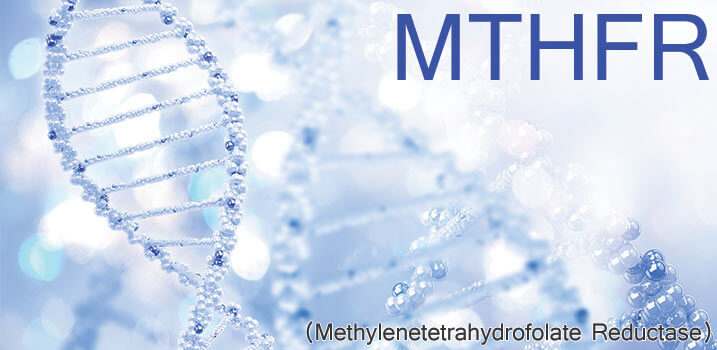
What Is MTHFR?
MTHFR stands for the methylenetetrahydrofolate reductase gene. When this MTHFR gene is healthy and non-mutated, it produces many, highly functioning MTHFR enzymes. If the MTHFR gene is mutated, even slightly, the MTHFR enzymes become distorted and they will not function correctly. This can lead to a myriad of health problems.
Common genetic dysfunctions like MTHFR are so alarming because many people do not know they have it. This can lead to severe health problems due to their inability to effectively process certain vitamins.
Experts estimate anywhere between 40%-60% of the population have some sort of MTHFR mutation.
Individuals with this MTHFR mutation are at a far greater risk of infection and disease due to an impaired immune function. Impairing the methylation cycle has profound effects on the body’s reduced Glutathione levels, inhibiting optimal recycling and synthesis of this master antioxidant.
Most Common MTHFR Mutations
The most common MTHFR mutations are found at the 677 and 1298 positions of the MTHFR gene.
Here is a breakdown of the most common MTHFR gene mutations.
MTHFR 677CC is the normal MTHFR gene in this position.
- MTHFR 677CT – A heterozygous mutation.
- MTHFR 677TT – A homozygous mutation.
MTHFR 1298AA is the normal MTHFR gene in this position.
- MTHFR 1298AC – A heterozygous mutation.
- MTHFR 1298CC – A homozygous mutation.
- MTHFR 677CT + MTHFR 1298AC – A compound heterozygous mutation.
Possible Conditions Related to MTHFR
MTHFR gene mutations impact a vast array of bodily functions, therefore the health problems related to the MTHFR mutation can vary widely. Here is a list of some of the most common health conditions that can stem from an MTHFR gene mutation:
- Autism
- Alzheimer’s Disease
- Asthma
- Bipolar Disorder
- Blood Clots
- Cancer
- Chronic Fatigue Syndrome
- Cognitive Impairment
- Down’s Syndrome
- Depression
- Epilepsy
- Fibromyalgia
- Glaucoma
- Heart Murmurs
- Increased Homocysteine Levels
- Infertility
- Irritable Bowel Syndrome
- Migraines
- Miscarriages
- Multiple Sclerosis
- Parkinson’s Disease
- Type 1 Diabetes
MTHFR has such a profound effect on the manifestation of these health conditions, yet it is so rarely addressed by medical professionals. Supplementing for MTHFR improves the methylation cycle and in turn, the function of virtually every system.
Folate vs Folic Acid
Folate is the term used for a group of water soluble B Vitamins, also known as B9.
Folic acid refers to the synthetic, oxidized compound that is often found in dietary supplements and foods fortified with Vitamin B9. Folate refers to the tetrahydrofolate derivatives that are naturally present in food.
In 1998, folic acid was introduced as a mandatory food fortification because of its ability to protect against neural tube defects in newborns.
Researchers now believe that long-term consumption of folic acid through supplements and food may relate to an increased risk of cancer and cognitive impairment.
Increased levels of unmetabolized folic acid in the blood is associated with decreased levels of natural killer cells. These natural killer cells play a vital role in tumor cell destruction, suggesting that excessive folic acid intake could promote existing premalignant and malignant tumors.
Folate is an essential cog in the metabolic cycle, the form used is tetrahydrofolate (THF). This tetrahydrofolate is metabolized in the small intestine, while the synthetic folic acid is first processed through the liver, placing a huge burden on the body’s key detoxifying organ.
Sources for Folate
Folate is essential for our health, it aids in the development of red blood cells, reduces homocysteine levels and supports nervous system function. It is commonly characterized by its ability to help prevent neural tube defects, making it a popular supplement for expecting mothers.
Food sources of folate include: spinach, asparagus, lettuce, broccoli, cauliflower, beets, lentils, parsley and liver.
Supplementing your dietary intake with folate is also effective. Look for supplements that contain 5-methyltetrahydrofolate (5-MTHF) and avoid products that use folic acid. Unfortunately most multivitamins use folic acid because it is far more inexpensive.
Nutrient Recommendations for MTHFR
Dr. Lynch is one of the leading experts on MTHFR gene mutations, founding the most popular resource for MTHFR on the web.
His recommended nutrient protocol for C677T MTHFR mutations include: Methylfolate, Methylcobalamin, N Acetyl-L-Cysteine, Glutathione, Pyridoxal-5-Phosphate, Riboflavin, Curcumin, Vitamin E, Silymarin, EPA/DHA (Omega-3), Vitamin C, Vitamin D3 and a Probiotic.
Almost all of which are found in abundance in GSH Gold, making our supplement one of the most complete MTHFR friendly multivitamins.

